Andrew Robbins of Ratio Christi at Texas A&M (“TAMU”) is a great example of why we’ve been encouraged to start our new College Prep division at the high school level. Robbins’ interest in apologetics was sparked during high school. He has “fanned the flame” by continuing these studies throughout his undergraduate work as an active RC member, serving first as treasurer, curriculum coordinator, and finally student president for two years. Robbins earned a BS in biomedical engineering in 2013 (with minors in mathematics and electrical engineering). He is currently pursuing a PhD in the same field and is staying with RC during this time.
Chapter Director Glenn Smith recently presented Andrew Robbins with the Legatus Christi certificate. For those not yet familiar with Ratio Christi’s Legatus Christi acknowledgment, it was started in honor of the late Jordan Slusher who was the first recipient.
Smith, who is also our regional director for Texas and parts of Louisiana,* tells us why he recognized Robbins with this outstanding student achievement:
“Andrew showed an aptitude in apologetics from the start, since he had already become acquainted with the discipline in high school. He has now spent several years in focused study with RC, was president of the chapter and a meeting leader, and worked well with the group for quite a while. He has engaged other people on campus including students from atheist groups and interacted with them extensively. He was deserving of this recognition.”
We caught up with Robbins at the end of the Spring 2015 semester to get his take on the value of a Ratio Christi apologetics education and his background that led to such.
Q: When did you accept Christ as your Savior?
A: I grew up in a Christian home and accepted Christ at a young age; I believe I was in the first grade.
Q: In your high school church youth group, did you learn a great deal about the Christian faith and reasons to believe in Christ?
A: The youth program in my Church was much more about spiritual development and Christian fellowship than learning about reasons for the faith. That’s not to say the program was bad – for me it just didn’t have the ‘meat’ it takes to prepare Christian students to go out into the secular college world. But I went to a Christian high school that had a very good Bible program.
Q: Is that where you got interested in apologetics?
A: Yes, it was one of the things we studied. We used materials from Francis Schaeffer and Ravi Zacharias and even watched one of William Lane Craig’s [of Reasonable Faith] debates. Discovering the rich intellectual heritage of Christianity intrigued me and began an interest in apologetics, philosophy, and Christian doctrine.
Q: And how did you get involved with RC?
A: At Texas A&M, there is a retreat called “Impact” that is sponsored by a number of Christian organizations. Its purpose is to give a Christian introduction to the college experience and provide students with some basic resources that will make the transition to college life easier. At this retreat, 40 or so Christian organizations give out their information to students. That is where I first heard of Ratio Christi in the fall of 2009. At that time, Ratio Christi was brand new, but they had a student representative at the retreat. Texas A&M had one of a handful of RC groups in the country, and my experiences with apologetics in high school suggested that I would be interested in RC, so I signed up for the mailing list.
Q: How has apologetics enriched your life, your own faith, and your witness to others?
A: Apologetics, and more broadly the intellectual discipline of thinking deeply about hard questions, has become very important in my life. Being unafraid to ask these hard questions is a deeply enriching experience; we never really know what we believe until we think deeply about it and question it. For me this has meant often admitting that I don’t know all of the answers but that I am still thinking deeply about the questions.
Contrary to common perception, I have found that studying apologetics and doctrine makes us more humble. The more I have studied, the more I realize that I don’t know very much at all. And until we appreciate how difficult it is to answer these hard questions, we can’t effectively evangelize to those who are also asking them.
All too often, Christians under-appreciate the questions that unbelievers ask. We like to give one-line Sunday school answers to questions like “Why does God allow evil?” These types of answers are generally seen as trite and unhelpful by unbelievers that are legitimately asking the question. But after studying apologetics, one should realize that this question is very complicated. I have found that I can more humbly address the concerns of the unbeliever in a way that has some meaning to them.”
Q: How would you describe the dynamics of your RC chapter?
A: We have a relatively large chapter and have been blessed with great success over the last few years. We have weekly meetings which are currently primarily made up of Christian students. There is an average attendance of about fifteen every week, with a couple of visitors at every meeting (we have had certain topics with attendance of over forty people). We have eight to ten students engaged in leadership, with another ten or so who are regularly involved. Our meetings are discussional, usually with about a twenty-minute presentation on a topic and then an open discussion on that topic. We also do a larger speaking event each semester where we bring in an apologist, philosopher, theologian, scientist, etc. This last fall we brought in Dr. Tim McGrew.
Q: How do you feel about being presented with the Legatus Christi certificate?
A: I am very proud to be the recipient of Legatus Christi. I had heard about it when the first was given posthumously to Jordan Slusher. I know that some incredible people have received the recognition, and it is a great honor to be among them.
(RC has an “Exponential Evangelism” component to Legatus Christi – i.e., the recipients of LC should have a goal of using their apologetics in supporting and building up other students to follow the example.)
Q: Do you think you will “carry the torch” of the apologetics you’ve learned into your future endeavors?
A: Yes, for me, apologetics has been about a way of thinking that I apply to all areas of my life. Ask hard questions, don’t accept the easy answers, know what you believe and why you believe it. My focus as a leader in RC for the last several years has been to bring up new leaders in the organization.
Q: Why is it important for young Christians to learn apologetics?
A: Apologetics and doctrine, that is knowing the content of the faith and knowing how to defend it, are critical disciplines of the Christian faith. We have a supremely rational God, and our faith is supremely reasonable. Therefore, when someone asks a legitimate question about what we believe, we should have a legitimate answer. Why should we expect anyone to become a Christian if we can not give good reasons for what we believe and good responses to objections to our faith?”
Well said, Andrew Robbins! And congratulations are also in order – in Spring of 2015, Andrew married his lovely bride, Leslie. See the wedding photo below!
Posted on Jun 16, 2015 by Sheryl Young Content in blogs does not necessarily represent Ratio Christi’s views.


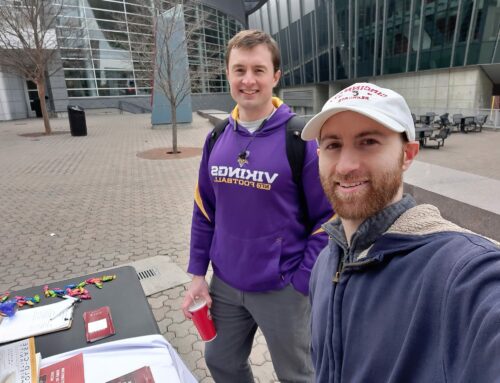
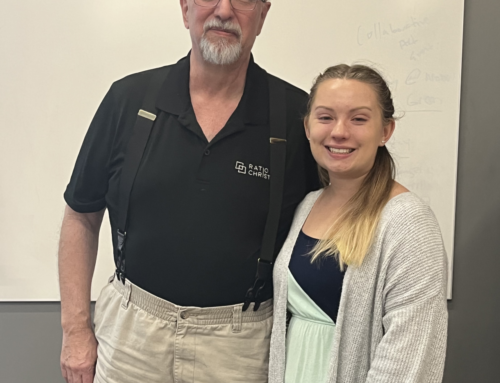
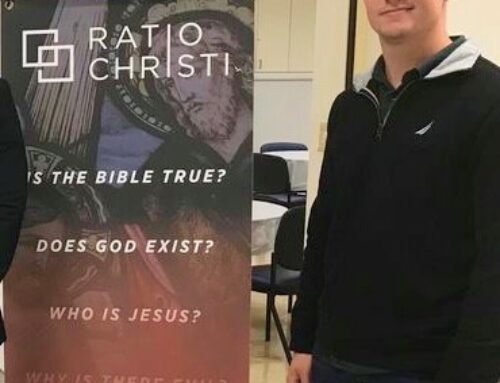
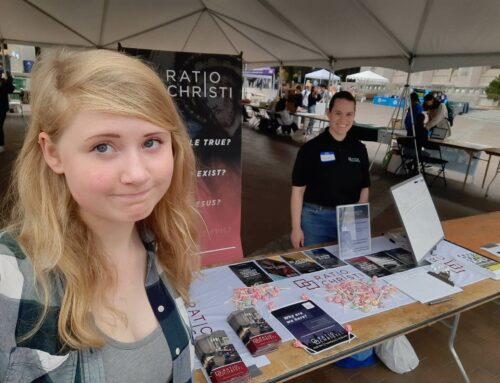

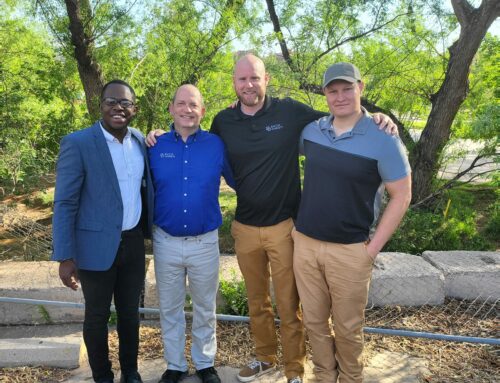
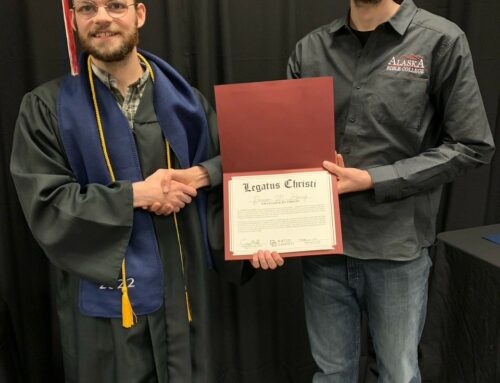

Leave A Comment